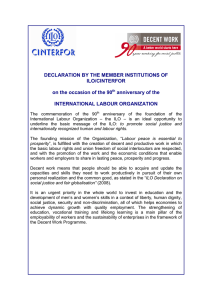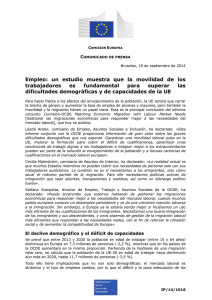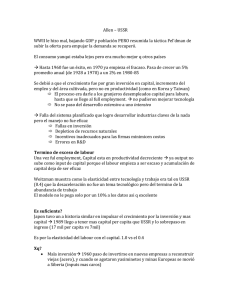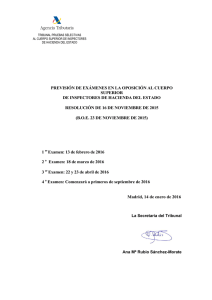Inspeccion trabajo en Colombia_web
Anuncio
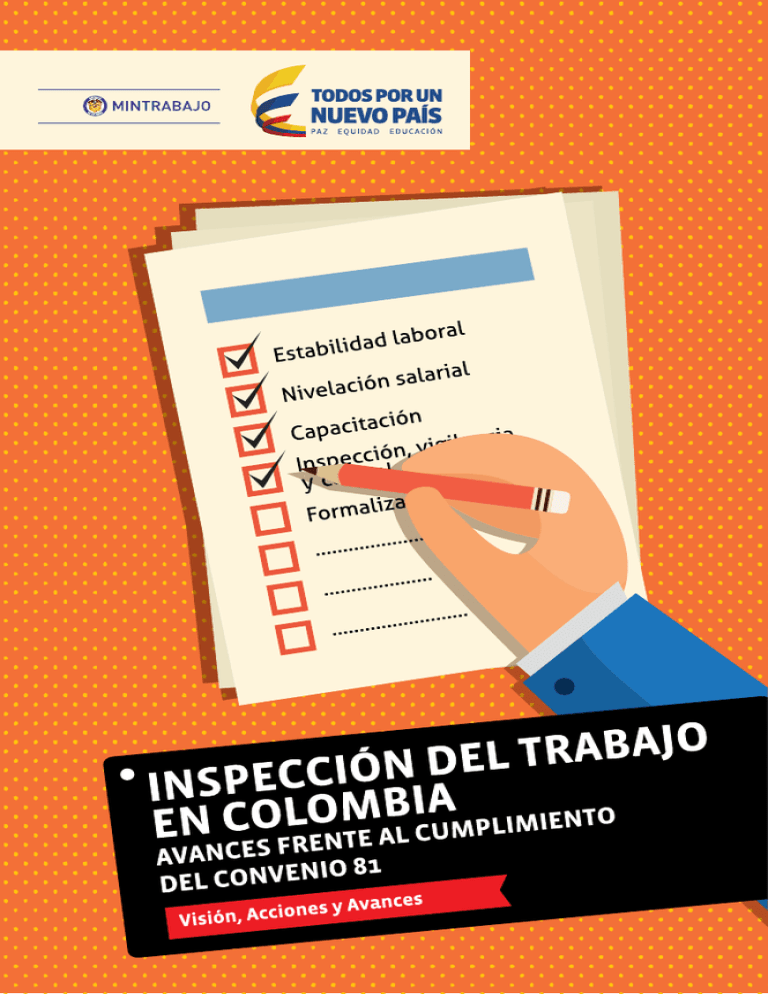
L ib ertad y O rd e n INSPECCIÓN DEL TRABAJO EN COLOMBIA AVANCES FRENTE AL CUMPLIMIENTO DEL CONVENIO 81 1 IDO CONTEN INTRODUCCIÓN 1. La visión de la inspección del trabajo 2 3 4 2. Estabilidad laboral y ampliación de planta de inspección del trabajo 4 3. Acuerdo de nivelación salarial de inspectores del trabajo 5 4. Capacitación de los inspectores del trabajo 5 5. Especialización de la inspección en temas prioritarios 6 6. Confidencialidad de identidad del querellante 7 7. Aseguramiento del desplazamiento de los inspectores del trabajo para mayor autonomía e independencia 7 8. Puesta en marcha del sistema de información de inspección, vigilancia y control 8 9. Instrumentos de formalización laboral 9 10.Fortalecimiento de la inspección del trabajo para acabar con la intermediación ilegal 10 11.El gobierno de Colombia garantiza el cobro efectivo de las multas 11 12.Informe nacional de inspección del trabajo 11 INTRODUCCIÓN El presente documento tiene el objetivo de informar a los actores sociales de Colombia y a la comunidad internacional sobre la visión, acciones, y avances de la inspección del trabajo en Colombia. La Comisión de Expertos en Aplicación de Convenios y Recomendaciones (CEACR) de la OIT, reconoció en su último informe avances de Colombia en materia de inspección, vigilancia y control. INSPECCIÓN DEL TRABAJO EN COLOMBIA AVANCES FRENTE AL CUMPLIMIENTO DEL CONVENIO 81 3 1 LA VISIÓN DE LA INSPECCIÓN DEL TRABAJO ACCIONES El Ministerio del Trabajo amplió la visión de la inspección del trabajo integrando las labores de información y asesoría (promoción y prevención), en armonía con lo establecido en el Convenio 81 de la OIT. 2 ESTABILIDAD LABORAL Y AMPLIACIÓN DE PLANTA DE INSPECCIÓN DEL TRABAJO ACCIONES Los inspectores del trabajo que son contratados en provisionalidad gozan de estabilidad en el empleo, según la jurisprudencia de las Cortes Suprema de Justicia y Constitucional. El Ministerio del Trabajo aumentó en tan sólo cuatro (4) años el número de puestos para los inspectores del trabajo, de cuatrocientos veinticuatro (424), pasó a novecientos cuatro (904) inspectores, lo que representa un incremento del ciento trece por ciento (113%). Actualmente se encuentran provistos ochocientos trece (813) cargos de inspectores del trabajo, equivalentes a un 89% y existen noventa y un (91) cargos vacantes, equivalentes al 11% de la planta, que serán provistos a más tardar en el mes de julio de 2015. Para ocupar el cargo de inspector del trabajo se exige título profesional en derecho, ciencias de la administración y/o medicina, título de posgrado en la modalidad de especialización en áreas relacionadas con las funciones del empleo y siete (7) meses de experiencia profesional relacionada. 4 3 ACUERDO DE NIVELACIÓN SALARIAL DE INSPECTORES DEL TRABAJO ACCIONES Como producto de un proceso de negociación colectiva con los sindicatos que representan los trabajadores del Ministerio del Trabajo, se acordó que a partir de julio de 2015 se hará una nivelación del 13% en los salarios que devengan los inspectores del trabajo. Esta nivelación significa un aumento de 8.34% que es adicional a la acordada con todos los empleados públicos de Colombia. Esta medida reconoce la función de los inspectores del trabajo y mejora sustancialmente sus condiciones de trabajo y empleo. Históricamente los inspectores del trabajo habían solicitado una medida de esta naturaleza y el gobierno había expresado su acuerdo con la pretensión, pero nunca antes se había materializado. 4 CAPACITACIÓN DE LOS INSPECTORES DEL TRABAJO ACCIONES El Ministerio del Trabajo en conjunto con el Proyecto de Cooperación Técnica de la OIT, Promoción del Cumplimiento de las Normas Internacionales del Trabajo en Colombia, capacitó a todos los funcionarios de la Dirección de Inspección, Vigilancia y Control en los siguientes Módulos de Capacitación. Módulo Módulo I - Procedimiento Administrativo Sancionatorio y Dosificación de la Sanción Módulo II - Formalización del Empleo e Intermediación Laboral Módulo III - Derecho Colectivo y Solución de Conflictos Módulo IV - Competencias de Inspección, Vigilancia y Control No. Capacitados 607 625 796 999 INSPECCIÓN DEL TRABAJO EN COLOMBIA AVANCES FRENTE AL CUMPLIMIENTO DEL CONVENIO 81 5 En promedio en estas capacitaciones hubo una participación por módulo de 757 inspectores, lo que equivale al 93% de toda la planta actual capacitada. Un promedio total del 83% de los inspectores están empleando las herramientas técnicas de los Módulos de Capacitación. El Ministerio del Trabajo en conjunto con el Proyecto de Cooperación Técnica de la OIT, Promoción del Cumplimiento de las Normas Internacionales del Trabajo en Colombia, lanzaron las Aulas Virtuales como parte de la estrategia de educación continua, con un total de 283 inspectores del trabajo inscritos en esta primera fase. Esto permite reforzar conocimientos y hacer procesos de entrenamiento a la nueva planta de inspectores. 5 ESPECIALIZACIÓN DE LA INSPECCIÓN EN TEMAS PRIORITARIOS ACCIONES Todos los inspectores del Trabajo cumplen funciones de control o policía administrativa, están facultados en la práctica para realizar labores de inspección, vigilancia y control, realizar visitas y sancionar. El Ministerio del Trabajo conformó tres grupos de trabajo con el propósito de atender de manera efectiva al ciudadano, así: • Prevención, Inspección, Vigilancia y Control; • Atención al Ciudadano y Trámites; y • Resolución de Conflictos y Conciliaciones. El Ministerio del Trabajo a través de su Dirección de Inspección, Vigilancia y Control especializó 6 a inspectores del trabajo en tres temas prioritarios: • 12 inspectores especializados a nivel nacional en trabajo infantil. • 17 Inspectores especializados a nivel nacional en casos críticos (poder preferente). • 100 Inspectores especializados a nivel regional y sectorial en intermediación laboral indebida. El Ministerio del Trabajo tiene previsto el diseño de estrategias de inspección, vigilancia y control con énfasis en poblaciones vulnerables y sectores prioritarios, según lo establecido en el Plan Nacional de Desarrollo. 6 CONFIDENCIALIDAD DE IDENTIDAD DEL QUERELLANTE ACCIONES La Resolución Ministerial núm. 1867 de 2014, garantiza anonimato de los querellantes y establece sanciones a los funcionarios que violen esta disposición. Se amplió el alcance de la Resolución Ministerial 1867 de 2014, habilitando a las Centrales Sindicales, Confederaciones, Federaciones y Organizaciones sindicales para la interposición de querellas en nombre de sus trabajadores afiliados y también de los no afiliados. 7 ASEGURAMIENTO DEL DESPLAZAMIENTO DE LOS INSPECTORES DEL TRABAJO PARA MAYOR AUTONOMÍA E INDEPENDENCIA ACCIONES El Ministerio del Trabajo adelantó una estrategia logística que permitirá garantizar: • Recursos para financiar el desplazamiento de los inspectores del trabajo a los centros de trabajo. • Efectividad en las visitas a partir de una asesoría técnica. • Autonomía e independencia en el desarrollo de la inspección. • Reconocimiento de las necesidades específicas de cada región. El Ministerio del Trabajo presentó demanda de inconstitucionalidad de la norma que establece la posibilidad a los inspectores del trabajo de solicitar al empleador (organización empresarial) o a los trabajadores (organización sindical) apoyo para efectuar sus desplazamientos cuando así lo ameritaran las condiciones del terreno donde se realizara la inspección. INSPECCIÓN DEL TRABAJO EN COLOMBIA AVANCES FRENTE AL CUMPLIMIENTO DEL CONVENIO 81 7 Adicionalmente, el Gobierno Nacional presentará proyecto de Ley, en el mes de julio de 2015, para derogar la misma norma, esta última medida busca dar celeridad a la protección de la independencia y la autonomía de los inspectores del trabajo. 8 PUESTA EN MARCHA DEL SISTEMA DE INFORMACIÓN DE INSPECCIÓN, VIGILANCIA Y CONTROL ACCIONES El Ministerio del Trabajo y el Proyecto de Cooperación Técnica de la OIT Promoción del Cumplimiento de las Normas Internacionales del Trabajo están desarrollando un Sistema Informático que permitirá: • Control y seguimiento efectivo en las actuaciones a través de indicadores de gestión y la generación de alertas. • Análisis de información para la toma de decisiones de política pública en inspección, vigilancia y control. • Optimizar los informes, reportes y estadísticas. 8 9 INSTRUMENTOS DE FORMALIZACIÓN LABORAL ACCIONES El Gobierno de Colombia estableció una Política Nacional de Formalización que cuenta con dos herramientas para su desarrollo: Los acuerdos de formalización laboral Figura que ha sido sistematizada por la OIT como una buena práctica para promover la formalización laboral. • 87 Acuerdos de Formalización suscritos que benefició a 21,442 trabajadores. • 49 Acuerdos de Formalización Laboral en trámite que beneficiarán a 5.668 trabajadores. La utilización de acciones coercitivas • Actuaciones Administrativas (Averiguaciones Preliminares Iniciadas de 2011 a 2014 – 41.087) • Averiguaciones Preliminares Iniciadas (de 2011 a 2014 – 32.134) • Averiguaciones Preliminares Archivadas (de 2011 a 2014 – 12.638) • Investigaciones iniciadas (de 2011 a 2014 – 40.052) • Sanciones (de 2011 a 2014 – 8.520) El valor total de las multas impuestas por el Ministerio del Trabajo en sectores priorizados de 2011 a 2014, suman más de USD$26,7 millones de dólares. El valor total de las multas impuestas por el Ministerio del Trabajo en otros sectores de 2011 a 2014, suman más de USD$139.5 millones de dólares. INSPECCIÓN DEL TRABAJO EN COLOMBIA AVANCES FRENTE AL CUMPLIMIENTO DEL CONVENIO 81 9 FORTALECIMIENTO DE LA INSPECCIÓN 10 DEL TRABAJO PARA ACABAR CON LA INTERMEDIACIÓN ILEGAL ACCIONES El Ministerio del Trabajo en conjunto con el Proyecto de Cooperación Técnica de la OIT Promoción del Cumplimiento de las Normas Internacionales del Trabajo en Colombia, han desarrollado seis herramientas técnicas para identificar el uso indebido de la intermediación y actualmente se capacita a los inspectores del trabajo en el análisis de las mismas. • Guía para la Dosificación de las Sanciones • Guía para el Procedimiento Sancionatorio Laboral • Check-list para Identificar Actividades Misionales Permanentes • Mapa de Procesos • Check-list para Identificar Ambiguas y Disfrazadas Relaciones Laborales • Mapeo de Contratación. Así mismo, están desarrollando un Plan de Intervención Integral para los Seis Sectores Críticos (portuario, palmero, minero e hidrocarburos, petrolero, floricultor, y azucarero), y de acuerdo con la particularidad de cada sector, se están adelantando acciones para promover los derechos en el trabajo de las personas vinculadas al sector a través de varias acciones: • Caracterización del sector • Capacitaciones con trabajadores y empresarios • Desarrollo de modelos de Acuerdos de Formalización Laboral de los sectores críticos • Mesas Tripartitas de Trabajo 10 11 El GOBIERNO DE COLOMBIA GARANTIZA EL COBRO EFECTIVO DE LAS MULTAS ACCIONES El artículo 221 de la Ley aprobatoria del Plan Nacional de Desarrollo 2014 – 2018: “Todos por un nuevo país”, establece que “el cobro de las multas impuestas por la Dirección de Inspección, Vigilancia y Control del Ministerio de Trabajo en favor del SENA, podrá ser asignado a una entidad pública del orden nacional, sin variar la destinación de los recursos establecidos en el artículo 30 de la Ley 119 de 1994. Para la realización de esta labor se plantean dos opciones, la: • Dirección de Impuestos y Aduanas Nacionales (DIAN) o • Unidad de Gestión Pensional y Parafiscales (UGPP). 12 INFORME NACIONAL DE INSPECCIÓN DEL TRABAJO El Gobierno de Colombia, por primera vez desde la ratificación del Convenio 81, elaboró y publicó en la página Web del Ministerio del Trabajo el Informe Nacional de Inspección del Trabajo año 2013, que fue remitido a la OIT a finales del año 2014. Periódicamente se elaborará, publicará y remitirá a la OIT el respectivo Informe, que también será de conocimiento público a nivel nacional. INSPECCIÓN DEL TRABAJO EN COLOMBIA AVANCES FRENTE AL CUMPLIMIENTO DEL CONVENIO 81 11 12 L ib ertad y O rd e n INSPECCIÓN DEL TRABAJO EN COLOMBIA AVANCES FRENTE AL CUMPLIMIENTO DEL CONVENIO 81 13 T CONTEN INTRODUCTION 3 4 1. The vision of the labour inspection 2. The labour stability, the expansion, extension and broaden of the labour inspectorate 4 3. Agreement on the labour inspectors’ wage leveling 5 4. The training of the labour inspectors 5 5. The specialization of the inspection in priority topics 6 6. Confidenciality of the complainant´s identity 7 7. Guarantee of the displacement of the labour inspectors to a major autonomy and independency 7 8. Commencement of the system of information, inspection, monitoring and control 8 9. Instruments of labour formalization 9 10. Strengthening the inspection of work to stop illegal outsourcing 10 11. Colombia ‘s government cash warrant the collection of fines 11 12. National report of labour inspection 11 INTRODUCTION The present document has as a main goal to inform the social actors of Colombia and the International Community about the vision, the actions and the advances of the labour inspection in Colombia. The Committee of Experts on the Application of Conventions and Recommendations (CEACR) from ILO, has recognized in his last report the advances of Colombia in terms of inspection, monitoring and control. LABOUR INSPECTION IN COLOMBIA ADVANCES TOWARDS THE COMPLIANCE OF THE CONVENT 81 1 THE VISION OF THE LABOUR INSPECTION ACTIONS The Ministry of Labour is broadened the labour inspection vision by integrating tasks such as giving information and consultancy (promotion and prevention), in harmony with the 81 Convention. 2 THE LABOUR STABILITY, THE EXPANSION, EXTENSION AND BROADEN OF THE LABOUR INSPECTORATE ACTIONS The labour inspectors are hired in provisionality which means that they count with a stability in their employment according to the jurisprudence of the Supreme Court of Justice and the Constitutional court. In just four years (4), the Ministry of Labour increased the number of posts to the labour inspectors. It passed from four hundred twenty four (424) to nine hundred four inspectors (904), which represent a growth of the one hundred thirteen percent (113%). Currently there are eight hundred thirteen (813) labour inspectors posts, which means 89% and we still have ninety one (91) posts. In terms of percentage, the 11%, are job vacancies and it is expected that will be taken at the latest on July 2015. The aspirant must have a Professional Degree in an academic discipline of the basic core of knowledge in Laws and similar, Medicine, Industrial engineering, Administration and Economy. In cases of the graduate degree does not correspond to the functions of the employment, there are required seven (7) months of professional experience related to thirty one months. 4 3 AGREEMENT ON THE LABOUR INSPECTORS’ WAGE LEVELING ACTIONS As a result of a collective bargaining process with the labour inspectors, an agreement on the labour inspectors’ wage leveling was reached. This agreement counts with a leveling of the 13% on the wage of the public employees of Colombia. In percentage terms a 8.34% over the agreed to the rest of public employees of Colombia. This measure recognizes the function of the labour inspectors and improves substantially their conditions of work and employment. Historically labour inspectors had requested a measure of this nature and the government had expressed his agreement with the pretension, but at the past it hadn´t been materialised. 4 THE TRAINING OF THE LABOUR INSPECTORS ACTIONS The Ministry of Labour, together with the Technical Cooperation Proyect of the ILO, the Promotion of the compliance on the International Standars of Labour in Colombia, they qualified all the public employees of the Direction of Inspection, Monitoring and Control in the following modules of training. Module Module I – Administrative procedure, penalty proceedings and Dosing of the Sanction Module II – Formalization of the employment and outsourcing Module III - Collective law and Solution of Conflicts Module IV - Competences of Inspection, Monitoring and Control No. Qualified 607 625 796 999 LABOUR INSPECTION IN COLOMBIA ADVANCES TOWARDS THE COMPLIANCE OF THE CONVENT 81 5 In these trainings there was participation per module of 757 inspectors averaged, which means that the 93% of the currently labour inspector´s plant is trained. An overage of 83% of the inspectors are using the technical tools learned in the Training Modules. The Ministry of Labour, together with the Technical Cooperation Proyect of the ILO, Promotion of the Compliance on the International Standars of Labour in Colombia, launched the Aulas Virtuales (virtual classrooms) as part of the Education Continues strategy, with a total of 283 labour inspectors signed in this first phase. The Aulas Virtuales (virtual classrooms) allow to reinforce knowledge and to do training processes to the new labour inspectorate plant. 5 THE SPECIALIZATION OF THE INSPECTION IN PRIORITY TOPICS ACTIONS The Ministry of Labour created three groups of work with the purpose of respond effectively to the citizen: • Prevention, Inspection, Monitoring and Control • Attention to the citizen and procedures • Resolving labour conflicts and conciliation. The Ministry of Labour, through his Inspection, Monitoring and Control Direction with the ILO support specialized labour inspectors in priorities areas such as: • 12 Specialized Inspectors across the national territory in child labour. 6 • 17 Specialized Inspectors in critic cases (preferred power) across the national territory. • 100 Specialized Inspectors, by regional and sectorial level in unfair labor intermediation. The Ministry of Labour has planned the design of strategies concerned to the inspection, monitoring and control with emphasis in vulnerable population and priorities sectors, according with the established in the National Plan of Development. 6 CONFIDENCIALITY OF THE COMPLAINANT´S IDENTITY ACTIONS The resolution of the Ministry No. 1867 of 2014 guarantee the anonymity of the complainants and establishes sanctions to the employees that violate this disposition. The scope of the Ministerial Resolution 1867 of 2014 has been expanded and it now empowers the Trade Union Organization, the Confederations, the Federations and the Trade Unions to interpose the denunciations on behalf of their unionised employees but also the ones who are not unionised. 7 GUARANTEE OF THE DISPLACEMENT OF THE LABOUR INSPECTORS TO A MAJOR AUTONOMY AND INDEPENDENCY ACTIONS The Ministry of Labour designed a strategy that will allow to hire logistic services which guarantee: • Resources to finance the displacement of the labour inspectors to their work place. • Effectiveness in their visits from a technical advice. • Autonomy and independence in the development of the inspection. • Recognition of the specific needs of each region. The Ministry of Labour presented a claim of unconstitutionality of the norm that establishes the possibility for labor inspectors to request the employer (employers’ organization) or workers (union) support to make the move when so warrant the ground conditions where the inspection will take place. LABOUR INSPECTION IN COLOMBIA ADVANCES TOWARDS THE COMPLIANCE OF THE CONVENT 81 7 Additionally, the Government submitted draft law in July 2015, to repeal the same standard, this measure seeks to speed to protect the independence and autonomy of labor inspectors. 8 COMMENCEMENT OF THE SYSTEM OF INFORMATION, INSPECTION, MONITORING AND CONTROL ACTIONS The Ministry of Labour and the Technical Cooperation Project ILO Compliance Promotion of International Labour Standards are developing a computer system that will: • Control and monitoring effective actions by indicators and alert generation • Analysis of the information for the decision-making of public policy on inspection, monitoring and control. • To optimize reports and statistics. 8 9 INSTRUMENTS OF LABOUR FORMALIZATION ACTIONS The Government of Colombia established a National Policy Formalization that has two tools for development: Labor formalizing agreements This figure has been systematized by the ILO as a good practice to promote labor formalization: • 87 agreements were formalized or signed in which benefited 21,442 workers • 49 Labor Agreements pending formalization that will benefit 5,668 workers. Use of coercive actions • Administrative proceedings (Preliminary investigations initiated 2011 at 2014-41087) • Preliminary investigations initiated (2011 at 2014-32134) • Archived or Preliminary Investigations (2011 at 201412638) • Initiated Research (2011 at 2014-40052) or Sanctions (from 2011 to 2014-8520) The total value of the fines imposed by the Labor Ministry in priority sectors of 2011-2014, totaling more than $ 26.7 million dollars. The total value of the fines imposed by the Ministry of Labour in other sectors of 2011-2014, totaling over $ 139.5 million dollars. LABOUR INSPECTION IN COLOMBIA ADVANCES TOWARDS THE COMPLIANCE OF THE CONVENT 81 9 10 STRENGTHENING THE INSPECTION OF WORK TO STOP ILLEGAL OUTSOURCING ACTIONS The Ministry of Labour in conjunction with the Technical Cooperation Project ILO Compliance Promotion of International Labour Standards in Colombia, has developed six technical tools to identify misuse of intermediation and labor inspectors it is currently trains in analysis thereof. • • • • • Guide dosing Sanctions Guide to the Labour penalty procedure Check-list for Identifying Permanent Mission Activities Process Map Check-list to identify and Ambiguous Disguised Labor Relations • Mapping Recruitment The Ministry of Labour and Technical Cooperation Project ILO Compliance Promotion of International Labour Standards in Colombia are developing a Plan of Integral Intervention to the Six Critical Sectors (port, palm, mining and hydrocarbons, oil, floriculture, and sugar), and according to the specificity of each sector are carrying out actions to promote rights at work of people involved in the sector through various actions: • Characterization of the sector • Training with workers and employers • Development of models Labor Agreements formalization of critical sectors • Tripartite Workshops 10 11 COLOMBIA ‘S GOVERNMENT CASH WARRANT THE COLLECTION OF FINES ACTIONS The Article 221 of the Law approving the National Development Plan 2014-2018 : “All for a new country “ , states that “the collection of fines imposed by the Department of Inspection, Monitoring and Control of the Ministry of Labour in favor of SENA , it may be assigned to a public entity of national order, without changing the allocation of funds set out in Article 30 of Law 119 of 1994 ACTIONS To develop the processes required to assign the function of the collection of fines for violations of labor rights, an entity with technical and operational capacity. To carry out this work two options arise, the: • Directorate of National Taxes and Customs ( DIAN ) • The Pension Unit and Parafiscales Management ( UGPP ). 12 NATIONAL REPORT OF LABOUR INSPECTION ACTIONS The Government of Colombia, by the first time since the ratification of the 81 Convent, elaborated and published the Report: National Labour Inspection 2013 in the web site of the Ministry of Labour. This report was referred to the ILO at the end 2014. The Ministry of Labour will elaborate, publish and refer to the ILO periodically the report mentioned, that will also be on public knowledge a national level. LABOUR INSPECTION IN COLOMBIA ADVANCES TOWARDS THE COMPLIANCE OF THE CONVENT 81 11
